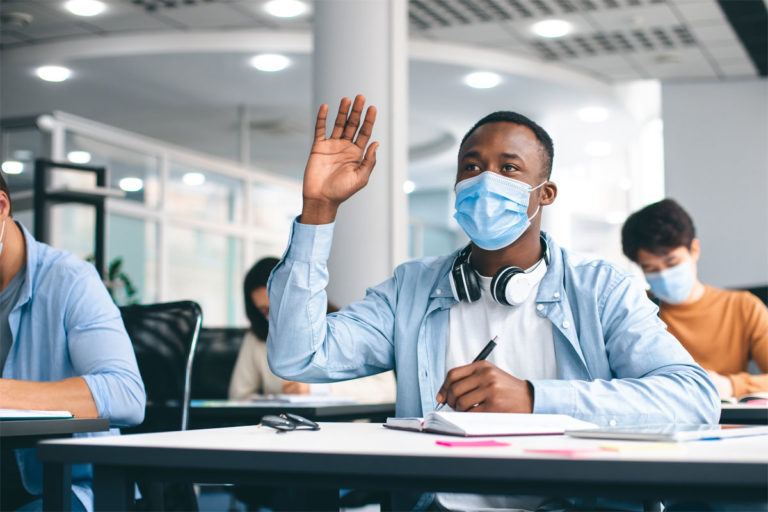Concern about a “twindemic” — the potential for severe flu outbreak on top of COVID-19 — is so great that officials around the world are urging people to get a flu shot as soon as possible.
The Centers for Disease Control and Prevention (CDC) encourages business leaders to implement a flu vaccine program for their employees. And Dr. Anthony Fauci, director of the National Institute of Allergy and Infectious Diseases, implores people to get the flu shot “so that you could at least blunt the effect of one of those two potential respiratory infections.”
The CDC historically purchases 500,000 doses for uninsured adults. This year, however, it ordered an additional 10 million doses. Of course we don’t know what degree of severity to anticipate, but even a mild flu season could overwhelm hospitals already coping with COVID-19 overload.
In a recent article in University Business, Chief Medical Officer at TimelyCare Dr. Alan Dennington urges colleges to guard against an outbreak by taking the following precautions:
- Make flu vaccines readily available to students for longer periods of time at a convenient location on campus.
- Continue with hygiene and public health campaigns that emphasize not only preventative steps like hand washing and wearing masks, but also the importance of getting a flu vaccine.
- Be prepared to test for both influenza and COVID-19.
- Send out reminders to students that if they get sick, they should not go to class and expose others to the illness.
- Communicate with faculty and staff that they too should stay home if they think they are getting sick.
- Be mindful that students are feeling stressed and anxious.
Of course, many of the same precautions that protect against COVID-19 also protect against the flu. “It’s the fact you’re keeping your distance, wearing a mask, washing your hands more, that you’re attentive that someone might have the illness and not know it,” said CNN Medical Analyst and emergency physician Dr. Leana S. Wen, professor of public health at George Washington University. Encouraging students to adhere to these public health measures will help minimize the spread of both COVID-19 and the flu.
What else can your campus do?
1. Urge students to get a flu shot.
According to the CDC, the flu vaccine reduces the risk of flu by 40% to 60%. While the vaccine won’t prevent COVID-19, it will place the flu lower on the list of possible viral illnesses students may contract this year. So, help students learn where they can get a flu shot and visit the CDC website to learn more.
2. Continue gathering outdoors.
Indoor gatherings will likely replace outdoor gatherings as we head into the winter months, creating a higher risk of airborne transmission. So, continue to move formerly inside gatherings to the outdoors as long as the weather allows. When you must move assemblies inside, aim for large locations that allow for social distancing and encourage students to wear face masks with two or more breathable layers. Learn about the latest recommendations for selecting, wearing and cleaning a face mask on the CDC website.
3. Prioritize mental and physical health.
A good foundation for success in higher ed starts with the health and wellness of the campus. Help your students understand how to practice self-care. Encourage them to turn off social media notifications for the weekend, bake with their roommates (check out these delicious things students can make in a microwave), go for a run, hike or spend time with friends without discussing homework or the pandemic.
4. Encourage students to practice healthy habits.
The following acts of social responsibility fundamentally slow and reduce the spread of COVID-19, and work equally well against the flu:
- Wear a mask.
- Keep social distancing.
- Wash your hands frequently.
- Avoid touching your eyes, nose and mouth.
- Stay away from people who are sick.
5. Tell students to be mindful of peers.
Ask students to support one another and encourage those who are sick to get care as soon as symptoms are evident. And as Dr. Dennington said, “In addition to taking care of their physical symptoms, it is vital that colleges address students’ continuing mental health issues. Given that these anxieties can kick in at any time of day or night, it is important to have someone available 24/7 to handle these issues.”
To ensure students always have someone to turn to, consider offering 24/7 access to mental health services, like TimelyCare. Contact TimelyCare to learn more about how you can meet your students where they are with telehealth.
There is reason to hope.
One indicator of the level of seasonal flu activity comes in cases seen in other parts of the world prior to the U.S. flu season. In August 2020, the World Health Organization reported that global influenza activity was at “lower levels than expected for this time in the year,” with the caveat that the influenza season has not yet started in the temperate zones of the southern hemisphere, and that countries like Australia have stricter social distancing guidelines.
But staying safe this fall isn’t a matter of optimism or pessimism. It’s a matter of taking all health risks seriously. By wearing masks, washing hands, avoiding enclosed public places and practicing social distancing on your respective college campus, you and your students will help reduce the spread of respiratory infections. Encourage your students to get a flu shot and engage in acts of social responsibility, and help avoid the impact of a potential twindemic on your college campus.
Contact TimelyCare to learn more about how you can meet your students where they are with telehealth.






